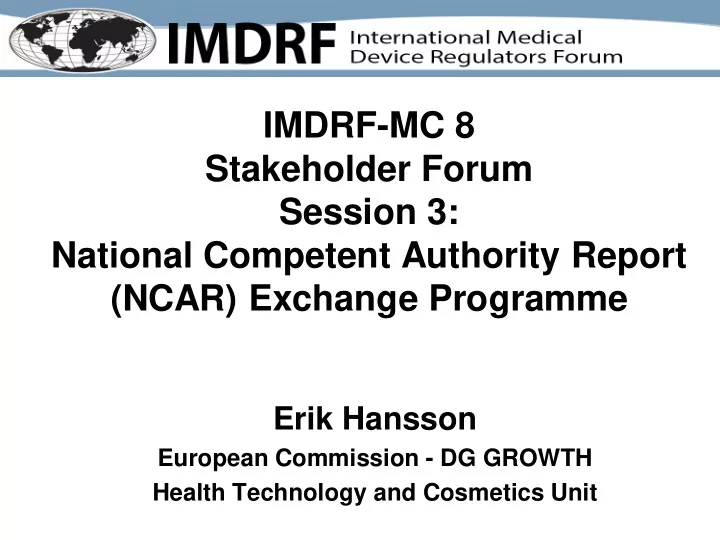

IMDRF-MC 8 Stakeholder Forum Session 3: National Competent Authority Report (NCAR) Exchange Programme Erik Hansson European Commission - DG GROWTH Health Technology and Cosmetics Unit
What is the importance of having post-market data for medical devices? • Post-market data for medical device are important for Competent Authorities in order to confirm the safety and performance of a medical device throughout its lifecycle and promptly identify any emerging safety issues • Medical device safety issues can be identified mainly through manufacture or health professional reporting, identification and reporting of issues by members of the public or through information sharing with other competent authorities 2
Why exchange post-market data at the international level? • Increased timely communication of post-market information creates opportunities for cooperation across global regions and favours a more harmonised approach • Jurisdictions may use these data to verify non-compliance of manufacturers with reporting obligations set by internal legislation as experience has proved that some manufacturers do not react in all jurisdictions with the same expediency following the occurrence of a serious adverse event in one particular country or region • A simple and rapid information exchange system on adverse events related to devices with global distribution therefore enhance patient safety on a global basis • GHTF/IMDRF is the ideal Platform to organise international exchange between Competent Authorities 3
The NCAR (National Competent Authorities Report) Exchange Program • Created under the umbrella of GHTF • Operative as from 1999 • Originally managed by the GHTF Study Group 2 (postmarket) • Steady increase of NCARs until 2013 4 (in total about 3,500)
Review of the NCAR Programme • The Programme underwent a critical review in 2012 • The review, while confirming the importance/relevance of the Programme, indicated a need for the revision of the existing Programme due to the following concerns: ◍ uneven participation of jurisdictions ( limited contribution from some jurisdictions) ◍ timing (often too late) ◍ type of information exchanged (original GHTF criteria interpreted in different ways but frequently including Field Safety Corrective Action) ◍ type/level of detail of information to be included in the form 5 • Confidentiality of information
The new NCAR Exchange Programme 6
Main objectives: • Improve protection of public health through more communication and cooperation • A high level of participation • Earlier information exchange on possible emerging issues • Fewer more focussed NCARs • Biannual statistical reporting 7
Main changes • Stricter confidentiality and participation criteria • New form for reports • Scope to include trends/analysis (early warning) • Detailed and more comprehensive training material • A stronger role for the Secretariat 8
Exchange criteria for new scheme: • Events leading to or highly likely to lead to an Unanticipated Serious Public Health Threat • Observations from National Trend Analysis (that are linked to serious public health threat) • Request and /or Share Information (on issues that have led or are highly likely to lead to serious public health threat and may affect other jurisdictions) 9
The new Exchange Programme is expected to : • Enhance confidence in the treatment of commercially sensitive/operational information • Ensure exchange of more useful information with more relevant details • Increase the quality/usability of the reports • Improve the undertanding/knowledge of Programme users • Facilitate better coordination of the Programme and improvement of data analysis • Clarify the criteria for information exchange with 10 clear examples and more consistent definitions
Pilot phase for the implementation of the new NCAR (Oct 2015 – March 2016) ● Framework and timelines laid down in the Pilot Plan ● Implementing materials to increase understanding and consistency amongst participants ● Regional teleconferences based on implementing materials to support training ● Possible multilateral teleconference with all participating members – feedback on training, pilot scheme implementation and application of criteria ● MC jurisdictions who were members of the previous Exchange Programme will participate in the Pilot (Australia, 11 Brazil, Japan, US, EU, Canada)
Next steps • Full implementation (from April 2016) Possible participation of other interested MC members provided that relevant confidential arrangements are in place • Evaluation (March 2017) Evaluation of functioning and report to the MC with possible proposals for follow-up • Consideration of extention of scope and participation 12
Recommend
More recommend